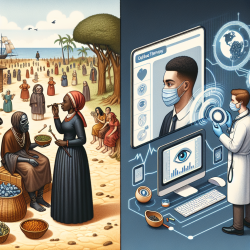In the realm of online therapy services, staying informed about historical health events can offer valuable insights into improving current practices. The research article "Notes on an Outbreak of Plague" by William Robertson, published in the Edinburgh Medical Journal in 1905, provides critical data that can enhance our understanding of outbreak management and its implications for speech-language pathology (SLP) services. As practitioners dedicated to creating great outcomes for children, it's essential to delve into such research to extract lessons that can be applied to our modern-day practices. This blog will explore key takeaways from Robertson's work and how they can inform and improve our online therapy services at TinyEYE.
Understanding the Context
Robertson's detailed account of the plague outbreak in Leith, Scotland, underscores the importance of thorough data collection and analysis during health crises. This meticulous approach is not only relevant to epidemiologists but also to SLP practitioners who aim to deliver data-driven, effective therapy.
Key Takeaways for SLP Practitioners
- Importance of Comprehensive Data Collection: Robertson's study emphasizes the necessity of gathering extensive data on affected populations. For SLP practitioners, this translates to the importance of detailed assessments and ongoing data collection to tailor therapy to each child's unique needs.
- Adaptive Strategies: During the plague outbreak, adaptive strategies were crucial in managing the crisis. Similarly, SLP practitioners must be flexible and adaptive, especially when delivering online therapy. This might involve modifying therapy plans based on real-time data and feedback.
- Collaboration and Communication: Effective management of the outbreak required collaboration among various health professionals. For SLPs, working closely with teachers, parents, and other therapists ensures a holistic approach to a child's development.
- Continual Learning and Improvement: Robertson's work highlights the importance of learning from each outbreak to improve future responses. SLP practitioners should continuously seek professional development opportunities and stay updated with the latest research to enhance their skills and therapy outcomes.
Implementing Research Outcomes
To integrate these historical insights into your practice, consider the following steps:
- Enhance Data Collection Methods: Utilize digital tools to collect and analyze data on your clients. This can include progress tracking software, detailed session notes, and regular assessments.
- Be Adaptive: Stay flexible in your therapy approach. Be prepared to adjust your methods based on the data you collect and the feedback you receive from clients and their families.
- Foster Collaboration: Create a network of professionals, including teachers, parents, and other therapists, to share insights and strategies. Regular communication can lead to more effective and coordinated care.
- Commit to Continuous Learning: Attend workshops, webinars, and conferences related to speech-language pathology. Engage with current research to keep your skills and knowledge up to date.
Encouraging Further Research
While Robertson's work provides a foundation, it's crucial to continue exploring and integrating new research into your practice. Encouraging further research within the SLP community can lead to innovative approaches and improved outcomes for children.
Conclusion
The historical insights from "Notes on an Outbreak of Plague" offer valuable lessons for modern-day SLP practitioners. By focusing on comprehensive data collection, adaptive strategies, collaboration, and continual learning, we can enhance our online therapy services and create better outcomes for the children we serve.To read the original research paper, please follow this link:
Notes on an Outbreak of Plague.










